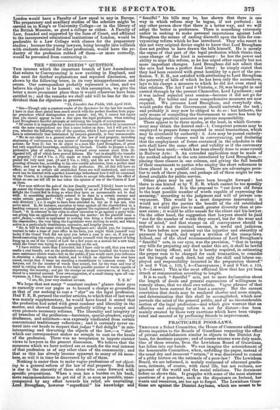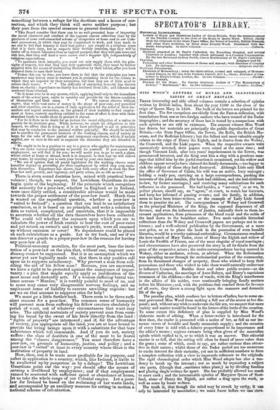PRACTICABLE POOR-LAWS. something between a refuge for the destitute and
a house of cor- rection, and which they think will serve neither purpose ; but they pass from the special measure to general doctrine.
" This Board consider that there can be no well-grounded hope of improving the moral character and conduct of the vagrant classes otherwise than by the provision of some well-concerted scheme of occupation at home and in our Colo- nial possessions, in which they may be constrained to work, and thus made to see and to feel that honesty is their best policy; not simply in a religions sense that it is their duty, but as respects their worldly interests, that they will be better off as honest labourers than as vagrant paupers, that they will gain more and risk less, that they will lead a more secure and a happier life, independently of
religious expectations. *
"To maintain their integrity, you must not only supply them with the prin- ciples of honesty, but that they may duly appreciate them, they must be further supplied with the means of maintaining themselves by their labour, after you have disposed them to earn their bread.
"Unless this can be done, you leave them to feel that the principles you have inculcated may indeed seem to warrant you in punishing them for the crimes to which they are impelled by their necessities, but that they are of little avail to relieve their wants. • * The difficulty of subsisting honestly has thrown them on charity; dependence on charity has rendered them idle; and idleness has rendered them criminal.
" So it must ever be in any system, which, applying itself only to the immediate wants of the actual poor, omits to consider and provide for the future condition of themselves and their class. * * We cannot observe without regret, that while vast sums of money in the shape of poor-rate, and parochial and other charities, are in a course of daily application for the relief of their im- mediate and urgent necessities, on the ground of their inability to find employ- ment at home, scarcely anything entitled to the name of effort is done with these abundant funds to enable them to procure it abroad.
"Far be it from us to doubt for an instant the moral obligation of a nation to provide for its destitute poor. While, however we admit its obligations in this respect, we affirm that in doing so it is at least privileged to act on principles that may be conducive to the national welfare generally. We should be careful not to sacrifice the permanent interests of the working classes, and of society at large, for the sake of those partial and temporary expedients, which, if unduly applied, are so sure in the end to augment the distresses they are intended to =neve.
" We ought to be in a position to say to a person who applies for maintenance, You are under natural obligations to provide for yourself. If you cannot find employment, we will find it for you; we will assist you to go to such a place, where, either at home or abroad, work is in demand: in that way we will relieve your wants, by enabling you to earn your bread by your own labour.'
"We are of opinion that all sound legislation for the working classes mast hereafter depend- on providing for them employment by which they may main- tain themselves. Experience has shown, that with every effort to work the New Poor-law well, poverty, and vagrancy, and petty crime, are as rife as ever."
There is stern sound doctrine here, mixed with practical bene- volence ; though, we suspect, the Lewisham Guardians do not begin quite at the beginning. If the principle which recognizes the necessity for a poor-law, whether in England or in Ireland, were once fairly settled, a considerable advance would be made towards the proper settlement of the poor-law itself. -Much time is wasted on the superficial question, whether a poor-law is "suited to Ireland" ; a question that can lead to no satisfactory
= i elusion, as it is based on no principle, and seeks a solution in data so varied, complicated, and uncertain, that it is impossible to ascertain whether all the data themselves have been collected. Who could tell whether the accounts upon which you are to calculate the power of Irish rentals to bear the cost of poor-rates
and yet return an owner's and a tenant's profit, were all summed up without omission or error? No dependence could be placed on such calculations as a guide. Let us try back, and see if we can discover a guide to a proper poor-law in the reasons for having
any poor-law at all.
Political-economy moralists, for the most part, base the insti- tution of a poor-law on the plea that, without one, vagrant men-
dicancy cannot be suppressed. But it is an assumption which we never yet saw logically made out, that there is any positive call upon us to suppress mendicancy. Why prevent a man from soli- citing the aid of his fellow man! Because, you are answered, we have a right to be protected against the annoyance of impor- tunity :- a plea that might equally apply as justification of the most mean and dastardly acts. If a woman suffering brutal vio- lence scream " Murder," it is terribly painful to most of us, and to some may cause very disagreeable nervous feelings, and an unpleasant sense of liability to execute unwilling exploits : but are we on that account to suppress cries for help '1 We must go a little further back. There seem to be three suffi- cient reasons for a poor-law. The common sense of humanity will prevent man from suffering his fellow creature absolutely to perish of want, out of whatever circumstances that want may arise. The artificial restraints of society prevent man from earn-
ing. his bread by the sweat of his brow directly from the land : " rights of property" are interposed ; and if, for the advantage of society, you appropriate all the land, you are at least bound to provide the living beings upon it with a substitute for that bare subsistence which toil commands. And if you do not, society. suffers : the class of destitute is one of the most to be feared among the "classes dancrereuses." You must therefore have a 'poor-law, on grounds of humanity, justice, and policy ; and a 'poor-law is "suited" at least to every country where there is the institution of property in land. How, then, can it be made most profitable for its purpose, and safest in application to a country, which, like Ireland, is liable to be swallowed up by pauperism as by a deluge? The Lewisham Guardians point out the way : you should offer the means of earning a livelihood by empIoyment ; and if that employment cannot be mustered with sufficient speed or abundance at home, let us take the whole range of our Colonial empire. Let a poor- law for Ireland be based on the reclaiming of her waste lands, and accompanied by an auxiliary measure for setting in motion a national scheme of colonization.



























 Previous page
Previous page